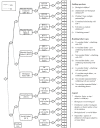Contemporary Fatherhood and Its Consequences for Paternal Psychological Well-being - A Cross-sectional Study of Fathers in Central Europe
- PMID: 27679796
- PMCID: PMC5020060
- DOI: 10.3389/fpubh.2016.00199
Contemporary Fatherhood and Its Consequences for Paternal Psychological Well-being - A Cross-sectional Study of Fathers in Central Europe
Abstract
The emotional consequences of fatherhood are markedly conditional on the context in which fatherhood is lived out. This study examines the association between different contemporary forms of fatherhood and paternal psychological well-being. The data are from an anonymous online survey of 3615 biological fathers, stepfathers, adoptive fathers, and foster fathers across the German-speaking countries of Central Europe. First, a detailed characterization of the different existing family constellations is provided. Second, the consequences of these different contemporary forms of fatherhood for paternal psychological well-being are investigated. Fathers of all ages (M = 40.11, range: 19-72) with at least one child under the age of 18 were included in the present analysis (N = 2785). The presented findings demonstrate that a family structure consisting of two biological parents with biological children seems to be most beneficial to paternal well-being, while some other forms of contemporary fatherhood are associated with impaired well-being, independently of sociodemographic or relationship aspects. More specifically, a history of family separation in non-residential biological fathers and blended-family fathers, and the concomitant loss of father-child contact, is shown to be particularly disadvantageous for the well-being of these fathers. Shared living arrangements, maintaining regular contact with biological children, or forming a new intact family could protect these fathers from negative outcomes.
Keywords: family structure; fatherhood; non-residential parenting; parental involvement; psychological well-being.
Similar articles
-
Experiences of African American adolescent fathers.West J Nurs Res. 1998 Apr;20(2):210-22. doi: 10.1177/019394599802000206. West J Nurs Res. 1998. PMID: 9550932
-
Nonresidential fatherhood and father-child relationships among Curaçaoan and Dutch adolescents and young adults.J Fam Psychol. 2024 Mar;38(2):270-281. doi: 10.1037/fam0001159. Epub 2023 Oct 23. J Fam Psychol. 2024. PMID: 37870779
-
Group-based transmission of fatherhood among intergenerational African American fathers: A case study.J Child Adolesc Psychiatr Nurs. 2019 May;32(2):73-79. doi: 10.1111/jcap.12227. Epub 2019 Mar 11. J Child Adolesc Psychiatr Nurs. 2019. PMID: 30859673 Free PMC article.
-
Fatherhood in Foster Care: A Scoping Review Spanning 30 Years of Research on Expectant and Parenting Fathers in State Care.Child Adolesc Social Work J. 2022;39(6):693-710. doi: 10.1007/s10560-022-00848-2. Epub 2022 May 18. Child Adolesc Social Work J. 2022. PMID: 35607512 Free PMC article.
-
Fathers' experience of depression during the perinatal period: a qualitative systematic review.JBI Evid Synth. 2022 Sep 1;20(9):2244-2302. doi: 10.11124/JBIES-21-00365. JBI Evid Synth. 2022. PMID: 35972064
Cited by
-
Implicit Motives and Men's Perceived Constraint in Fatherhood.Front Psychol. 2016 Nov 23;7:1856. doi: 10.3389/fpsyg.2016.01856. eCollection 2016. Front Psychol. 2016. PMID: 27933023 Free PMC article.
-
Emotions and Steroid Secretion in Aging Men: A Multi-Study Report.Front Psychol. 2017 Sep 29;8:1722. doi: 10.3389/fpsyg.2017.01722. eCollection 2017. Front Psychol. 2017. PMID: 29033885 Free PMC article.
References
-
- Knoester C, Eggebeen DJ. The effects of the transition to parenthood and subsequent children on men’s well-being and social participation. J Fam Issues (2006) 27(11):1532–60.10.1177/0192513X06290802 - DOI
-
- Skevik A. ‘Absent fathers’ or ‘reorganized families’? Variations in father-child contact after parental break-up in Norway. Sociol Rev (2006) 54(1):114–32.10.1111/j.1467-954X.2006.00604.x - DOI
-
- Yeung WJ, Sandberg JF, Davis-Kean PE, Hofferth SL. Children’s time with fathers in intact families. J Marriage Fam (2001) 63(1):136–54.10.1111/j.1741-3737.2001.00136.x - DOI
-
- Parker K, Wang W. Modern Parenthood: Roles of Moms and Dads Converge as They Balance Work and Family. Washington, DC: Pew Research Center; (2013).
LinkOut - more resources
Full Text Sources
Other Literature Sources


